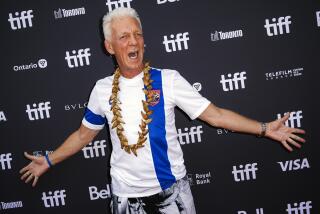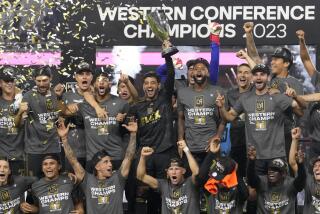South Africans feel the hope evaporate
The roadside flag sellers saw it coming first.
When South Africa’s heady swell of World Cup unity and patriotism suddenly ebbed, they sensed it. With the elimination of the national soccer team from the tournament last month, the flags for sale at traffic lights were gone.
Abram Chabalala went back to peddling car fresheners. Others touted bags of oranges, lurid bunny scarves, cell phone chargers, world globes and caps.
“Those flags, they is finished,” said Chabalala, who shuffles between cars on a dusty four-lane highway, thrusting his box of car fresheners toward closed windows.
For a few glorious months, the flags had sold themselves, a hopeful suggestion that this nation — often divided between rich and poor, black and white — was coming together. It was the moment, as retired Archbishop Desmond Tutu of Cape Town put it at the World Cup kickoff concert, that South Africa had transmuted from an ugly caterpillar into a beautiful butterfly.
It was a moment, say some analysts, that was not likely to last.
Not that hosting the tournament wasn’t good for the South African soul, said political analyst Alistair Sparks, despite criticism that the $4 billion used for stadium and airport upgrades would have been better spent on schools and hospitals.
“We need that. We are a psychologically damaged people,” he wrote in a recent column, referring both to the legacy of apartheid’s oppression of blacks and the stigma on whites as a pariah people. “It has rendered us all somewhat manic depressive — up one day with euphoric expectations and in a pit of despair the next day when it goes flat.
“We need upliftment to engender a sense of self-worth and a recognition of our own common worthiness.”
When South Africans of all races walked out of their offices to blast their vuvuzela horns and cheer the national team as the tournament began last month, the glowing unity and national pride seemed as if it would last forever. It was reminiscent of that day in 1995 when former President Nelson Mandela donned the rugby jersey of Springboks captain Francois Pienaar, a gesture that turned the country’s World Cup rugby victory into a powerful symbol of post-apartheid South Africa, portrayed in the film “Invictus.”
Adam Habib, deputy vice chancellor at the University of Johannesburg, said successfully staging the tournament was an important symbol for the country and the continent. “It is a kind of coming of age of this country and gives it a much more global orientation,” he said.
But while the country was genuinely unified for a time by the tournament, many question the government’s contention that it can build on that spirit at home and capitalize on the international goodwill.
“I don’t think there’s a depth to it,” said political analyst William Gumede of Witwatersrand University. “This is a temporary phenomenon. If they [government officials] had the political vision, they could have built on this. But this goodwill, it’s going to be lost.”
The closest many well-to-do South Africans ever get to poverty is through their car windows, looking at traders like Chabalala. To the vendor, the unity that lit up Twitter and filled talk radio didn’t change anything. In fact to him, it wasn’t even noticeable.
More people bought flags and he made more money than usual. But their attitudes toward him didn’t change.
“There was nothing different,” he said.
He cannot find a job, though he graduated from high school. He plans to use the $800 he saved from four months of flag sales to train for a new occupation, perhaps as a paramedic.
But, like many poor blacks living in South Africa’s townships, he still believes in the government rhetoric that riches will flow from the tournament.
“This is going to make the country rich,” he said. “There will be jobs.”
Economic statistics, however are not encouraging. Despite the economic boost from the building of infrastructure ahead of the World Cup, 171,000 jobs were lost nationwide in the first quarter of the year.
The World Cup is projected to just break even, according to Finance Minister Pravin Gordhan, with the benefits to the economy about equal to outlays by the government.
Gumede, the analyst, said President Jacob Zuma’s ruling African National Congress, brawling over the leadership succession, lacks the will to turn an optimistic moment into something more powerful and lasting.
The health and education systems are deeply troubled. Poverty and social inequity remain intractable. The annual strike season, when public and private sector unions negotiate wages with government and business, will resume later this month. Protests over the poor delivery of public services may also grow vehement.
“The legacy of the World Cup will be people demanding and expecting things to happen, because we have spent all this money on all these things for the World Cup,” said Gumede. “Wage demands are going to be a lot more strident. Ordinary communities are going to say if you can build all these stadiums, you cannot say there’s not money to deliver to us. The unemployed are going to say the same thing.”
Habib, the university vice chancellor, believes the unity cannot last because of South Africa’s entrenched inequality.
“Some people have suggested that [the World Cup] will bring about a level of social cohesion and they all speak about Mandela wearing the Springbok jersey in 1995,” he said. “That was a wonderful thing, but social cohesion is never sustained in a highly unequal society.
“Our greatest danger is inequality, because inequality creates polarized atmospheres and pathologies of violent crime, child abuse and so on,” Habib said. “And that is why, despite everything, we are still fighting and killing each.”






